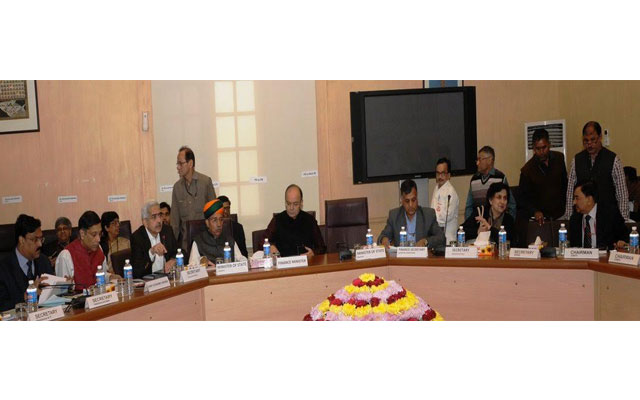
Union Finance Minister holds Pre-Budget Consultative Meeting with the representatives of IT Industry
The Finance Minister said that India’s competence in IT-Software is recognised globally and in recent times, software development and Information Technology Enabled Services (ITeS, including BPO & KPO) industry had emerged as one of the most dynamic and vibrant sectors in India.
He said that the Government recognises the potential of IT sector, hence Electronic Systems and IT & BPM (Business Process Management) are included among 25 sectors in ‘Make in India’ programme.
Jaitley said that the electronic market in India is one of the largest in the world and is expected to reach US $400 Billion in 2020.
Jaitley was speaking at Pre- Budget Consultative Meeting with stakeholders from IT (Software / Hardware) Sector. During the meeting, various suggestions were received from the participants for boosting the IT sector.
It was brought forth that Government support was required for IT sector in view of increasing trends of protectionism and anti-globalisation abroad.
Also rapid changing nature of technology in IT field makes it imperative to focus on R&D in IT, hence, the Government needs to promote R&D and innovation in IT sector in a big way.
Further, there are issues about speed and penetration of broadband in India. Number of Wi-Fi hotspots is very low in the country.
Hence, it was suggested that over-ground towers and underground fiber cable network need to be improved in a big way. At the consumer end, smart phone prices need to be further brought down so that broadband is more accessible to masses.
It was appreciated in the discussion that green shoots are visible in smart phone manufacturing industry in India and manufacturing of these phones is increasing rapidly. Also, street price of these Indian made smart phones is competitive when compared to Chinese made phones. So the next logical focus of Indian smart phone manufacturers should be to target the export market.
To further boost electronic manufacturing in country, suggestions were made to extend the duty differential scheme to all ITA goods, specifically for personal computers (Desktop, Laptop). A proposal requested that list of CPE goods should be make comprehensive for Duty Differential Scheme to further promote and implement ‘Make in India’ initiative. Representatives sought that this scheme must continue to exist in GST regime.
To create an ecosystem for electronics and IT hardware manufacturing, proposal for a ‘Component Trading Hub’ was discussed. It would bring down logistics costs by creating robust infrastructure for connectivity. Participants also insisted on the need to encourage populated PCBs manufacturing in the country by restricting their direct imports.
A representative from a robotic firm requested for incentives to boost the robotics sector in country which is non-exist now.
Adoption of personal computer will be a catalyst for transformation of country to a digital economy and knowledge economy. To increase PC penetration, it was also proposed that easy loans (3-4% per annum ) should be provided by banks for the purchase of personal computers and cost of PC should be allowed for deduction under Section 80C of Income Tax Act.
Concerns were shown in the meeting that increasing digitisation should not lead to increased digital divide in the country. So internet need to be more open, transparent and easily accessible to all. Suggestions were given to improve cyber security structure in India and establish a cyber test range.
It was proposed that there should be a mechanism for reporting any vulnerability detected in a Government software System by any private person/agency.
Image: Ministry of Finance Twitter page
Support Our Journalism
We cannot do without you.. your contribution supports unbiased journalism
IBNS is not driven by any ism- not wokeism, not racism, not skewed secularism, not hyper right-wing or left liberal ideals, nor by any hardline religious beliefs or hyper nationalism. We want to serve you good old objective news, as they are. We do not judge or preach. We let people decide for themselves. We only try to present factual and well-sourced news.







